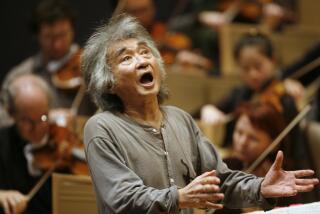Sadness, Gratitude Mark Japan Farewell to Emperor
- Share via
TOKYO — Japan bade farewell Saturday to its modern patriarch, Emperor Hirohito, with a complex blend of emotions ranging from gentle sadness to gratitude and relief.
“This is the end of an era, and I’m extremely sad,” said Koshiro Murai, 72, one of nearly 130,000 people who streamed to the gates of Fukiage Palace in central Tokyo to sign condolence books for Hirohito. “We suffered together and grew up together. I’m grateful for his perseverance.”
Hirohito’s death, after nearly four months of battling the terminal stage of duodenal cancer, lifted a vexing psychological burden from the nation, which has awkwardly attempted to maintain proper imperial protocol and exhausted itself keeping vigil over the ailing monarch.
“I feel sorry for him, but I’m also relieved,” said Sanae Tatemoto, a 19-year-old student. “From now on we won’t have to listen to the daily reports on his hemorrhaging and blood transfusions.”
A new era named Heisei, or “attaining peace,” begins today under Emperor Akihito, 55, who ascended to the Chrysanthemum Throne immediately upon his father’s death early Saturday. In keeping with the Japanese tradition of counting the years in terms of imperial reigns, the first year of Heisei (pronounced hay-say) now replaces the 64th year of Hirohito’s era of Showa, or “enlightened peace.”
Officials said the new era name--an allusion to passages in classical Chinese texts meaning peace within and without a nation as well as on Earth and in heaven--was chosen to underscore Japan’s commitment to pacifism and its repudiation of the militaristic aggression that marred the early part of Hirohito’s rule.
Rising sun flags with black mortuary streamers attached to them sprouted at most public buildings Saturday, and television networks devoted themselves exclusively to special programming about Hirohito and the imperial family. But the nation did not completely stop or plunge into abject mourning.
Life went on as normal in the capital, although the pace was somewhat subdued and dark clothing was common. Most stores, businesses and restaurants remained open, and a mood of self-restraint was not obvious until evening, when the famous neon lights of the Ginza shopping and entertainment district were left darkened. Many nightclubs and dance halls shut down for the weekend.
Moderation generally prevailed. The Tokyo Stock Exchange canceled its Saturday half-day session, but banks and post offices remained open. Pachinko pinball parlors kept their doors open but turned off blaring martial music and took down gaudy plastic floral displays. Race tracks closed, but Tokyo’s Kabuki Theater stayed open.
Government offices will remain open next week, but civil servants have been instructed to refrain from singing, dancing and drinking as a gesture of respect to the late emperor, whose state funeral is expected to be held Feb. 24 with leaders from around the world attending.
In a notable departure from the confusion that disrupted Japanese diplomacy after Hirohito first became seriously ill on Sept. 19, officials said that Foreign Minister Sosuke Uno would not cut short his three-day visit to Paris, where he is attending an international conference on chemical weapons and has scheduled meetings with his U.S. and Soviet counterparts.
Opportunity to Reflect
For many Japanese, Hirohito’s demise provided an opportunity to reflect on the tumultuous years of his reign. Yasuo Yoshiki, 53, director of a pharmaceutical company, decided to take his 11-year-old son, Yasumasa, to the Imperial Palace and later to the darkened streets of Ginza for a history lesson.
“He can’t possibly understand what his father feels today,” Yoshiki said. “I was his age when the war started, and I remember being burned out of my family’s Tokyo home in the firebombing and strafed by American planes after we took refuge in the countryside. When the war ended we were unhurt, but we were starving.”
Yasumasa, the son, complained about missing his favorite television programs. Though he thinks of the deceased emperor as a “gentle grandfather,” he admitted, “I can’t say I really feel sad like my father.”
Youthful disinterest in the imperial transition was as evident as the emotional outpouring of the older generation. In Roppongi, a nighttime entertainment district, young Japanese lined up to enter the Tokyo branch of the Hard Rock Cafe, a rock-and-roll pub. Inside was the usual Saturday night capacity crowd.
“The emperor has nothing to do with us,” a waiter said. “Try the Ginza.”
Traditional critics of the emperor system were quick to air their disdain for what they contended was the sudden glorification of the institution by right-wing, revanchist politicians. An anti-emperor group staged a small street protest. The Central Committee of the Japanese Communist Party issued a statement declaring that “Hirohito bears the heaviest and supreme responsibility” for Japan’s aggression in World War II.
In contrast, Prime Minister Noboru Takeshita said in a statement Saturday that Hirohito “resolutely brought to an end the war that had broken out in spite of his wishes, out of a determination to prevent further suffering of the people, regardless of the consequences to his own person.”
More to Read
Sign up for Essential California
The most important California stories and recommendations in your inbox every morning.
You may occasionally receive promotional content from the Los Angeles Times.












